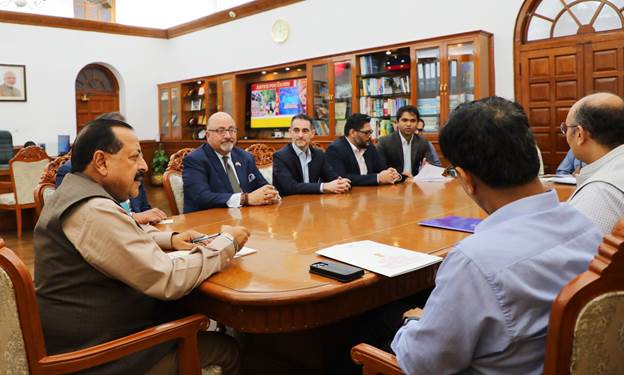AI’s impact on fashion design is nothing short of revolutionary. McKinsey’s analysis suggests that within the next three to five years, generative AI has the potential to significantly boost operating profits in the apparel, fashion, and luxury sectors…writes Mamata Roy
In recent years, the fashion industry has undergone a significant transformation, where technology is making waves and stealing the spotlight, with artificial intelligence (AI) at the epicenter of this transformation. This dynamic duo of fashion and AI is not just tweaking design processes and redefining our shopping experiences; it’s also prompting some big questions about sustainability and ethics in the fashion industry.
Think about predicting fashion trends, and you have AI. Take IBM’s Watson Trend App, for example. This intelligently designed tool analyzes heaps of online data to predict what styles are going to be trendy. So, instead of designers relying solely on gut feelings, they can use AI insights to create collections that match what people are buzzing about.
AI’s impact on fashion design is nothing short of revolutionary. McKinsey’s analysis suggests that within the next three to five years, generative AI has the potential to significantly boost operating profits in the apparel, fashion, and luxury sectors. Conservatively estimated, this could mean an addition of $150 billion, with the possibility of reaching up to $275 billion.
Furthermore, AI stepping into design processes has put creativity on autopilot. Whether it’s crafting design twists or playing with patterns and textures, AI is stretching the limits. The upshot? Speedier, more efficient design workflows, enabling fashion houses to stay nimble in keeping up with changing tastes.
Revolutionizing the Shopping Experience
AI is on the verge of revolutionizing industries, already making a significant impact across all sectors. According to Statista, global artificial intelligence in the fashion market amounted to 270 million U.S. dollars in 2018 and is expected to reach 4.4 billion U.S. dollars by 2027.
In the realm of online shopping, AI is revolutionizing personalization. It tailors your shopping journey based on preferences and behaviour, offering recommendations that boost engagement. Moreover, AI-driven virtual try-on experiences bridge the gap between online and in-store shopping, allowing real-time product visualization.
But AI goes even beyond personalization; acting as your digital stylist, analyzing past purchases and trends to curate outfits tailored to your taste. Platforms like Heuritech leverage AI to analyze social media images, helping brands like Louis Vuitton and Dior anticipate trends and align production.
AI’s Impact on Influencer Marketing
Influencer marketing has emerged as a cornerstone of marketing strategies for brands across all industries. With the rise of social media, consumers are increasingly turning to influencers for product recommendations and lifestyle inspiration. These digital tastemakers, with their large and engaged followings, have the power to sway consumer behaviour and shape purchasing decisions.
In the fashion sector, where trends change rapidly and consumer tastes are diverse, AI is playing a crucial role in optimizing influencer collaborations. By analyzing vast amounts of data, AI identifies the most relevant influencers for brands, based on audience demographics, engagement rates, and content preferences.
This targeted approach ensures that brands collaborate with influencers who resonate with their target audience, maximizing the impact of their marketing efforts. Additionally, AI-powered tools help track and measure the effectiveness of influencer campaigns, providing valuable insights for future strategies.
Sustainability and Ethical Considerations
The fashion industry ranks as the second most polluting sector, responsible for 8% of global carbon emissions and 20% of global wastewater, according to MDPI. In response to growing environmental worries, AI is becoming a crucial partner in promoting sustainability within the industry. AI algorithms can optimize supply chains, reduce waste, and aid in the creation of eco-friendly materials. By predicting demand more accurately, fashion brands can minimize overproduction and contribute to a more sustainable industry.
As technology progresses, ethical concerns take center stage, especially in AI’s role in fashion. Questions arise about data privacy, labour ethics, and the perpetuating of biased beauty standards. Balancing innovation with ethical responsibility becomes crucial. Despite its transformative potential, integrating AI into fashion faces hurdles. Challenges include data security, algorithm biases, and the demand for skilled professionals to manage AI systems.
What Future Holds for the Duo
As AI advances, we’re looking at a future where it plays a bigger role in making fashion more sustainable. With AI getting better and better, more companies might join in to tackle environmental issues and find new ways to be eco-friendly. This means we could see AI used more in designing clothes, running stores, and making fashion greener.
The blend of tech and fashion, especially AI, is changing things in big ways. AI helps predict trends, makes shopping cooler, and pushes for greener practices. As fashion keeps up with these changes, it’s important to be smart and ethical about how we use technology.
ALSO READ-AI is boosting access to healthcare: MBZUAI












